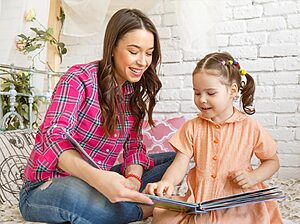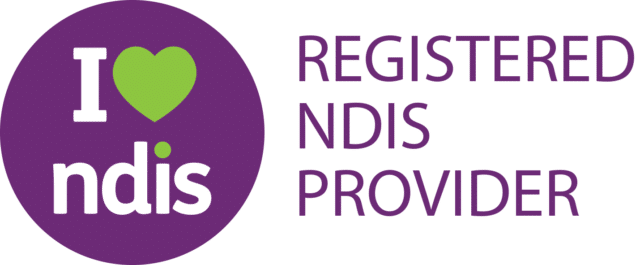1. Play face-to-face games with your child
For instance, bubbles, throwing a ball, row row your boat or peek-a-boo. These games provide opportunities to engage with your child using not only your words but also each other’s facial expressions. This promotes your child’s attention and increases social interactions.
2. Expand on words your child is already using
If they are using one word, provide them with two words e.g. if they say “car” say “blue car!”. If they are using two words turn them into short phrases e.g. if they say “teddy go” say “yes, teddy go in the car” When expanding your child’s language use gestures to help them understand what you are saying e.g. say “teddy wash face” (and imitate washing your face)
3. Read books to your child
Reading to your child every day helps to build your child’s vocabulary and listening skills. Look for books that contain a variety of words and concepts – animals, transport, shapes, numbers and action words e.g. running, flying. Books with rhyming and repetition help your child to learn to read. When reading books ask open-ended questions. Make broad comments and let your child tell you what is happening in the pictures. Make sure to introduce new books with more complex language and ideas as your child’s language skills develop. Your local library and websites such as ebay and gumtree provide affordable access to books.
4. Look for opportunities for pretend play
Use your child’s toys at home to create pretend play games such as shoe shops, restaurants, mummies and daddies and hairdressers. Pretend play allows children to act out familiar routines that include everyday language.
5. Don’t over-correct your child
Sometimes your child will mispronounce words or not consistently use words in their vocabulary. It takes time for children to produce adult pronunciations of words and for words to appear regularly in their vocabulary. If your child says “yum yums” say, “yes dinner”. Rather than insisting your child say the word correctly just continue to provide the correct model and your child will eventually learn to say it by themselves.
6. Take your child on regular outings to increase their exposure to new and interesting vocabulary
Take photos or make a memory book with mementos from your excursion and label the new vocabulary in the pictures. Encourage your child to retell the events of the outings with others.
7. Involve your child in everyday routines
For instance, doing the washing, going shopping or baking a cake provides opportunities for your child to learn everyday language within familiar routines and to practice following simple instructions. Use number and colour concepts and verbs e.g. “put the red shirt in the machine”, “give me one peg”, “pour the milk”.
8. Sing songs
Sing short songs with repetition and actions such as Twinkle Twinkle Little Star, Head Shoulders Knees and Toes or those with instructions and maths concepts such as Hokey Pokey and Five Little Ducks. As your child learns the words pause and allow them to initiate or finish lines of the song.
9. Ask questions that allow your child to make a choice using language
Rather than asking “would you like a drink” (your child can just shake or nod their head without using words) ask “Would you like milk or juice?”. Pause and give your child the chance to respond before repeating the question.
10. Let your child take the lead and reward their attempts at communication
Observe what they are interested in, wait for them to initiate communication and listen to what they have to say. Make comments when your child communicates to show them that you are listening and encourage them to tell you more. If you don’t understand your child make your best guess to keep the interaction going.
Important note: These tips are not intended to replace the services of a Speech Pathologist. If you are concerned about your child’s language development, we recommend that you consult with your child’s teacher, your GP, or a qualified Speech Pathologist.
If you are one of our daycare or preschool partners, you will be receiving this handout and another in the post over the next few weeks. Should you not receive this, please feel free to get in touch with us as below. We hope you find this information helpful!
To speak to our team at Communicate, please contact us on 02 9328 3444 or info@communicatespeech.com.au. You might also like to check out our website www.communicatespeech.com.au or facebook page www.facebook.com/CommunicateSpeech.




